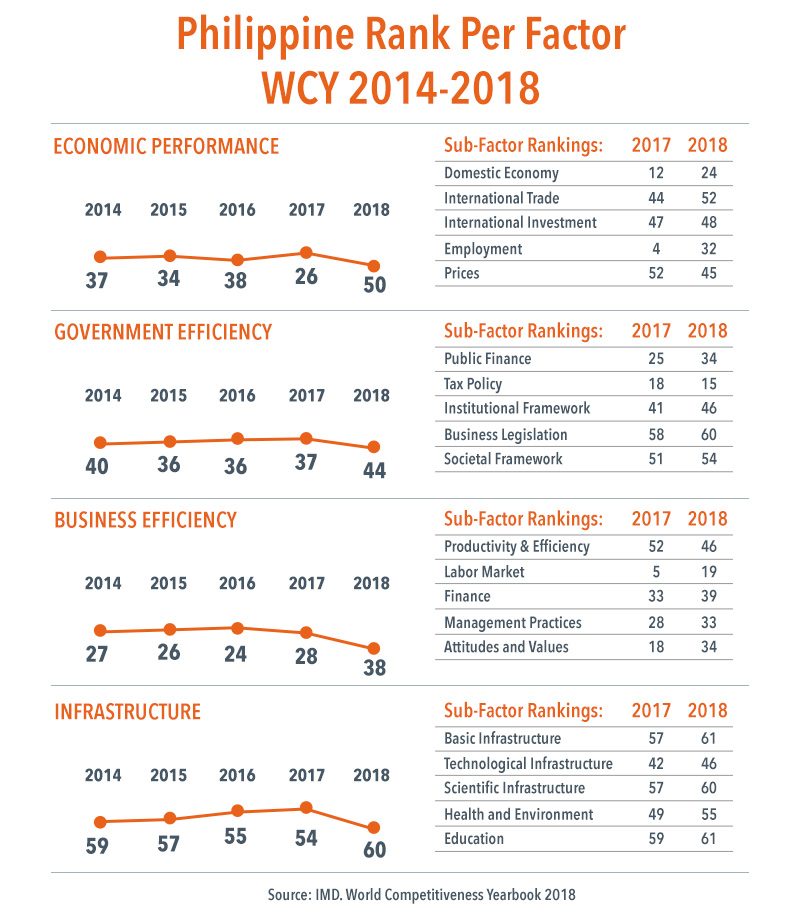SUMMARY
This is AI generated summarization, which may have errors. For context, always refer to the full article.

MANILA, Philippines – The sharp fall of the Philippines in the 2018 World Competitiveness Yearbook (WCY) should serve as a “wake-up call,” business leaders said on Thursday, May 24.
Philippine Chamber of Commerce and Industry (PCCI) President Alegria Sibal-Limjoco said the dip in the Philippines’ competitive ranking by 9 notches in the 2018 WCY – to 50th place from 41st place last year – is a “wake up call for government and for business.”
Guillermo Luz, Private Sector Co-Chairperson of the National Competitiveness Council, reiterated that the government should pay attention to the numbers of the WCY, as well as other studies.
He explained that results of the study is a snapshot of how the Philippines is performing compared to its peers in Asia Pacific.
“We compete for FDIs, trade, tourists, branding. It is a competition, we need to look at what other countries are doing,” Luz said.
“In the ASEAN region, competition never sleeps. Respondents of these surveys look how we keep up with competition, how government implements regulation, and the measurability in terms of impact in the economy,” he added.
The WCY study releleased on Thursday revealed that the Philippines is 50th out of 63 economies in terms of overall competitiveness. This is the country’s worst year-on-year decline over the last decade and the steepest drop in Asia Pacific.
The ranking is measured according to 340 indicators, about two-thirds of which are based on data and statistics, and the rest on the perceptions of over 6,300 executives worldwide.
Where it all went wrong
Despite having the fifth strongest real gross domestic product (GDP) growth in Asia Pacific in 2017 at 6.7%, the Philippines’ economic performance saw its biggest drop to 50th from 26th in 2017.
The report noted that the country’s current account deficit fand oreign direct investments (FDIs) were not impressive as compared to 2016. The peso was also dubbed as the most unloved currency in 2017, even posting 11-year lows against the US dollar.
Inflation also accelerated towards the end of 2017. As a result, the domestic economy, one of the sub-factors measured, declined to 24th from 12th place in 2017.
Jamil Francisco, executive director of the Asian Institute of Management’s Rizalino Navarro Policy Center for Competitiveness also noted the disappointing employment figures.
“The economy is resilient. But if you look at the employment of the regular [Filipino], this is where you see the problem because many have come in and out of unemployment,” Francisco said.
Employment in the WCY survey plummeted to 32nd place in 2018 from 4th in 2017. The drop was due to a slight increase of unemployment and a slight decrease in the number of employed as compared to other countries ranked in the survey.
The factor with the second largest drop in rank was business efficiency, now at 38th place from 28th place last year.
The report stated that the decline in business efficiency was caused by the dip in the following sub-factors: labor sector (5th to 19th), finance (33rd to 39th), management practices (28th to 33rd), and attitudes and values (18th to 34th).
The Philippines ranked near bottom the – 62nd place from 59th last year – in overall productivity in labor, agriculture, industry, and services.
Meanwhile, government efficiency experienced a 7-notch drop, now at 44th place from 37th. The decline was driven by dips in public finance (25th to 34th), institutional framework (41st to 46th), business legislation (58th to 60th) and societal framework (51st to 54th).
The country’s infrastructure, ranked at 60th place from 54th in 2017, continued to disappoint. The report noted that the government should also pay attention to basic, education, and scientific infrastructure and not just physical infrastructure.
“Good infrastructure promotes competitiveness by connecting markets and production sites, improving the flow of information and technology, and reducing the costs of production,” the report said.

Recommendations
Despite the gloomy figures, Limjoco said that investors are still interested to do business in the country and recognized the government’s efforts.
“Despite our competitiveness going down, there is something also that they like in our country. The tax reform will help our country move forward,” the PCCI president said.
Management Association of the Philippines President Ramoncito Fernandez also rallied support for the tax reform program of the government.
“We also support the necessary amendments of certain economic provisions of the 1987 Constitution,” Fernandez said.
The report recommended that the government invest in quality infrastructure, increase human capital, and strengthen institutions.
“In the digital era, workers must learn how to learn fast. Lifelong learning must be founded on quality basic and secondary education,” the report said.
It also stated the need to increase digital competitiveness, as “many jobs are at high risk of automation.”
WCY also recommended the need to manage the recent spike in inflation due to the effects of the tax reform program. – Rappler.com
Add a comment
How does this make you feel?
There are no comments yet. Add your comment to start the conversation.